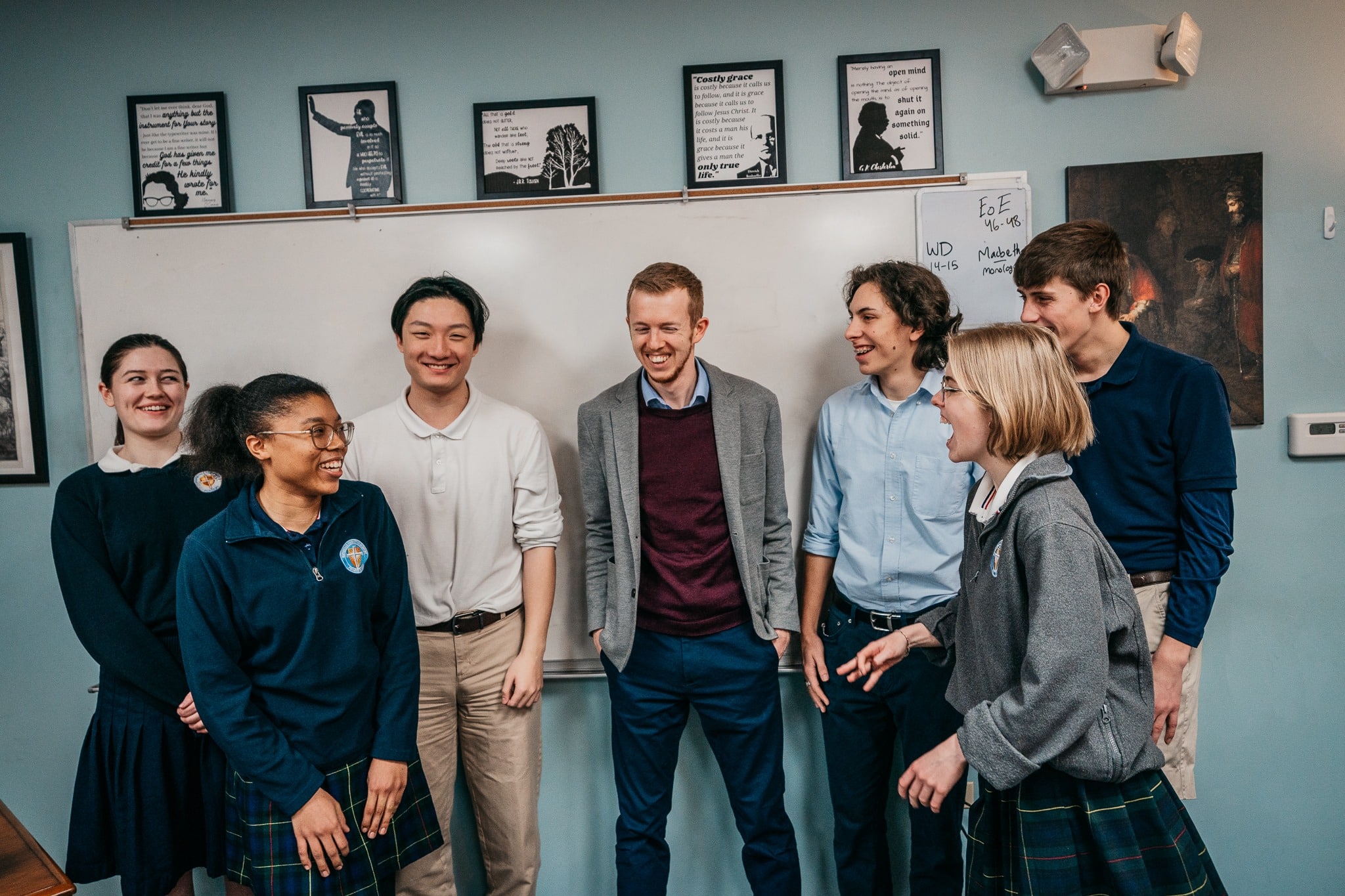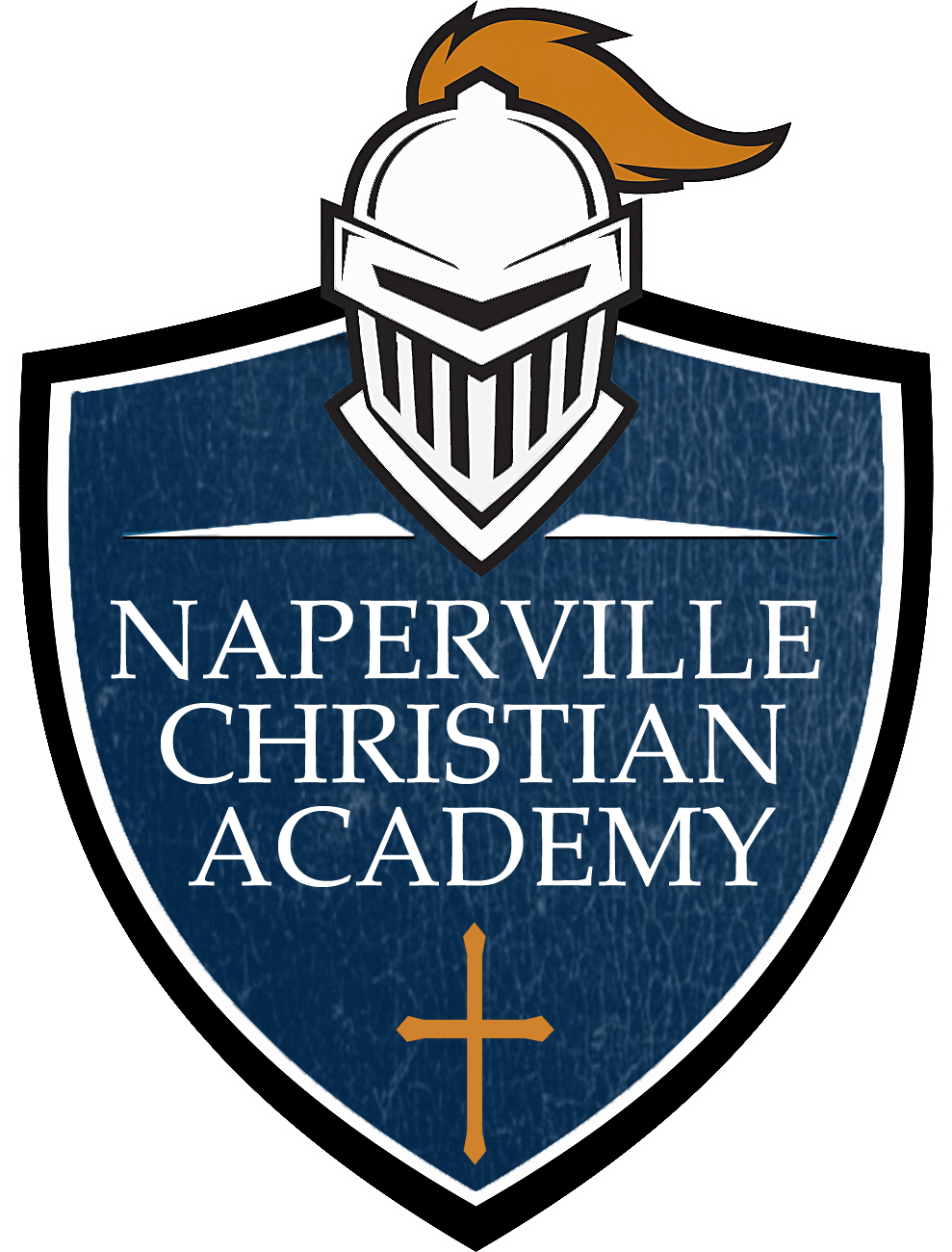Rhetoric School
Where young men and women embrace the power of speech in service of the truth
“Now at last they were beginning Chapter One of the Great Story which no one on earth has read: which goes on for ever: in which every chapter is better than the one before.”
– C.S. Lewis

The final phase of education at Naperville Christian Academy is the Rhetoric stage (grades 9-12). These capstone years focus on the excellence of the student as a producer of both written and verbal sentiments. The students engage in regular debate in humanities, share reflections on personal beliefs in Bible/Theology, investigate the realms of science and math, and translate and recite primary sources in Latin and Greek. These final years are designed to allow the students to go out from NCA ready to flourish and achieve great things at any university or profession of their choosing.
9th Grade
The 9th grade student re-enters the realm of Ancient History, which they first surveyed in first grade, reading both literary and historical texts from that period. Through this deeper study, they engage in the development of the rhetorical skills necessary to reason, persuade and communicate eloquently. Students begin to exercise independent thought and draw their own conclusions from the previous academic stages of Grammar and Logic, and primarily focus on the persuasive use of information through speech and writing in English, Latin, and through the lens of Scripture.
10th Grade
The 10th grade student further develops their rhetorical skills through reason, persuasion, and speech by interacting and conversing with primary source documents from the Medieval Period. Students hone their ability to organize, analyze, and comprehend all subjects through the lens of God’s creation and the study of English and Latin. At this stage, students have mastered the Latin language by being able to fluently read great Latin texts of history in their original forms and connect these texts with the Humanities and Sciences.
11th Grade
The 11th grade student eloquently converses and reasons with great works of the notable Modern European authors, as well as primary source documents to further develop the skill of argumentation, debate, logic reasoning, and persuasive argument. Emphasis is given to extensive practice in speaking and creating original work. Students are expected to write reflective research papers synthesizing their previous rhetoric courses by integrating the three appeals to speak authoritatively and accurately, passionately, and credibly. Students further sharpen their ability to organize, analyze, and comprehend all subjects through the lens of God’s creation and gain a deeper understanding of Scripture through the study of biblical Koine Greek.
12th Grade
The 12th grade student, poring over two centuries of American History, continues to build upon their analytical and rhetorical skills from the previous three years by powerfully articulating ideas, crafting original arguments and creating original work. Students gain proficiency in biblical Koine Greek to further interact with Scripture in its original language and other primary source documents. A senior exemplifies the Portrait of Graduate, which means being a Follower of Christ, a Master of Language, a Delighter in God’s Creation, A Reflective Composer, and a Renewer of Culture. Students research and defend a 15–25 page Senior Thesis presentation in front of a panel of judges to complete their high school experience. A senior ultimately embodies what it means to be human with excellence of character, eloquence of speech, growth as a member of the body of Christ, and the beauty of partaking in a liberal arts curriculum. Students depart NCA with a desire, love and fluency of language, education, creation, and God, and continue the great conversation.
Rhetoric School Curriculum Overview
| Subjects | Grade 9 | Grade 10 | Grade 11 | Grade 12 |
|---|---|---|---|---|
| Bible | Old Testament | New Testament | Doctrine | Christ and Culture |
| Humanities (History, Literature, Composition, Rhetoric) | Ancient History: The Epic of Gilgamesh, The Iliad, The Aeneid, Oedipus Rex, Bhagavad-Gita, Tao Te Chang, Plato, Aristotle, Augustine’s Confessions, & others | Medieval History: Beowulf, The Saga of the Volsungs, Piers Plowman, Dante’s Divine Comedy, Canterbury Tales, Boethius, Shakespeare & others | European History: Enlightenment Philosophers, Paradise Lost, A Tale of Two Cities, Jane Eyre, Frankenstein, Stories by Tolstoy, Brave New World, & others | American History: Federalist Papers, Common Sense, Democracy in America, East of Eden, Great Gatsby, Stories by Flannery O'Connor, & others |
| Classical Languages | Intro to Grammar or Ancient Latin | Intermediate Grammar or Medieval Latin | Ancient Latin or Greek I | Medieval Latin or Greek II |
| Math (Standard Track) | Algebra I, Geometry, or Algebra II | Geometry, Algebra II/Trig, or Pre-Calculus | Algebra II/Trig, Pre-Calculus, or AP® Calculus | Pre-Calculus, AP® Calculus, or AP® Stats |
| Science | Chemistry | Biology | Physics | AP® Biology |
